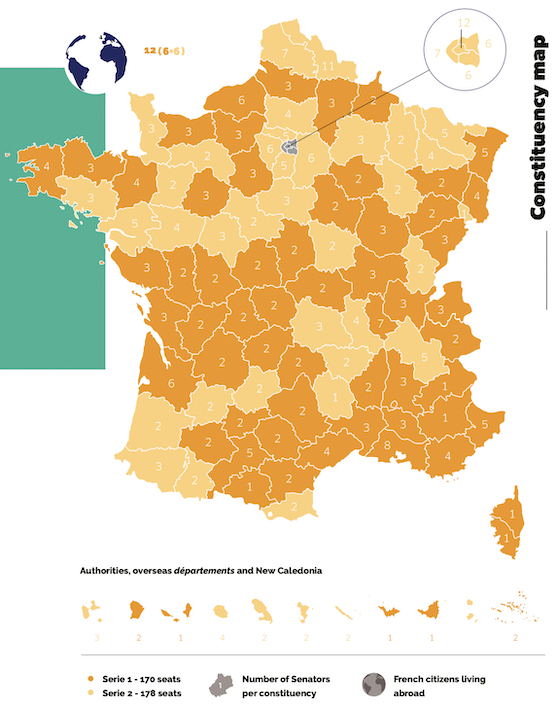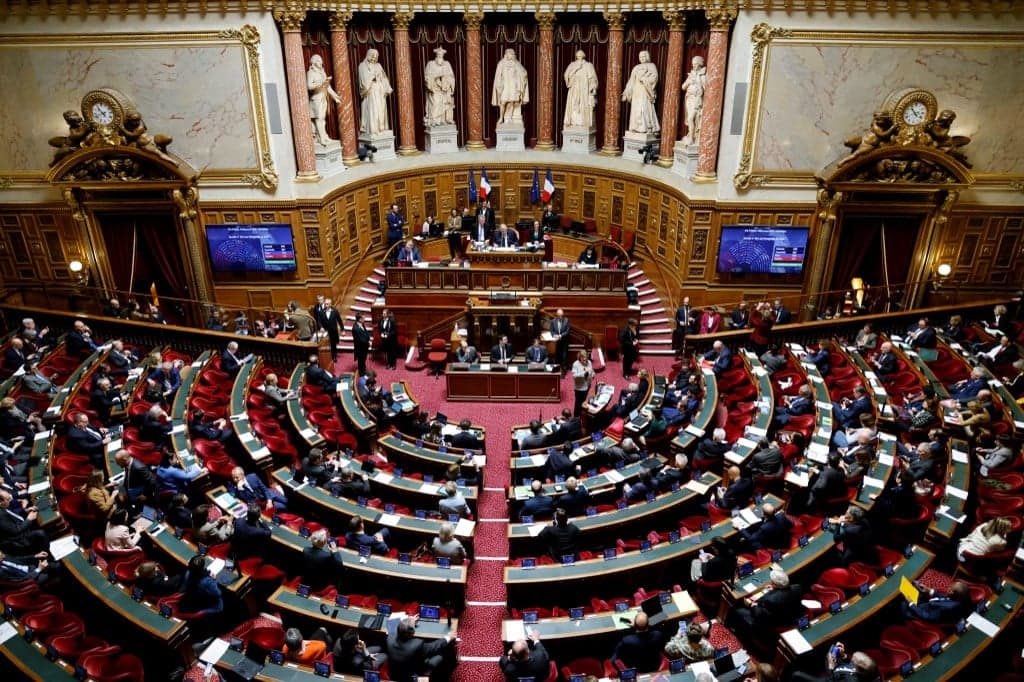An important election is coming up in France on Sunday, September 24th - although it probably won't receive heavy media coverage.
France's Senate, the upper house of the country's parliament, will renew half (170) of its 348 seats on Sunday.
However, the general public will not take part in the voting process.
What are 'indirect' elections?
Senators are elected 'indirectly' - which means that the general public does not choose the candidates or parties, as they would in a direct voting system. Instead, they elect the people who will do the voting.
In France, the voting for senators is up to the country's grands électeurs (electoral college), which consists of approximately 162,000 elected officials - including elected regional councillors, département councillors, mayors, municipal councillors in larger communes and MPs in the National Assembly.
Those selected for the electoral college are required to vote, and if they fail to do so they risk a fine of €100. How they vote is entirely up to them (although naturally they tend to vote along party lines).
Municipal councillors and département councillors made up the majority of delegates (95 percent) of the grands électeurs as of 2023.
The size of the commune determines how many delegates represent it - so for a commune of less than 9,000 inhabitants with a town council of just seven to 11 members, there would be one delegate (member of the electoral college). In contrast, a commune with between 9,000 to 30,000 inhabitants would have all of its municipal councillors (of which there could be between 29 to 35 members) serving as delegates in the electoral college.
How does voting work?
There are two distinct voting methods for electing French senators, and which one is chosen depends on the number of seats to be filled in that département. In départements with one or two senators to be elected, the 'first-past-the-post' option is used, meaning voters in the electoral college get to choose a single candidate and the one with the most votes wins.
In départements with three or more senators to be elected, proportional representation lists are used.
In comparison, the lower house of parliament, the Assemblée Nationale, is elected with a direct voting system. The 577 deputés take up five year terms (subject to dissolution).
The different voting methods between the two houses are "to ensure that all the diverse components of French society are represented as fairly as possible."
The theory being that if your area votes strongly in favour of the centre-left Parti Socialiste then the delegates elected are PS, and they in turn will pick PS senators - so that the overall views of the area are represented in the Senate.
Senate terms
Senators are elected to six year terms and are allowed to run for re-election as many times as they like. Many senators serve for a long time - for example, the current president of France's Senate, Gérald Larcher, was first elected in 1986.
In the 2020 election, of the 172 renewable seats up for vote, 94 were incumbents, and 78 were newly elected.
How often are they elected?
Senate elections occur every three years, with half of the seats voted on each time. This September, the 170 'serie 1' seats will be voted on.
You can see where the serie 1 (darker orange) elections are to be held in the map below.
Each département has a different number of senators representing it, which is proportional to the number of constituents who live there - so the city of Paris has 12 senators, the Nord départment 11, and the sparsely-populated département of Lozère just one.
 Credit: Senat.Fr
Credit: Senat.FrWho are France's senators?
The average age of senators at the beginning of their term, according to official figures, is 60 years and two months (the minimum age to run is 24).
In total 67 percent (232 senators) are men, with 315 of the 348 officials representing metropolitan France. The remaining 33 represent French overseas territories and departments, and French citizens living abroad.
The make-up of the delegates tends to over-represent rural areas which means, on the whole, the Senate leans to the centre-right of France's political spectrum.
It is usual for the Senate to have a different political mix than the Assemblée Nationale and it has only had a leftist majority once since the foundation of the Fifth Republic in 1958 - for the three-year period between 2011-2014.
The centre-right Les Républicains party currently holds 145 seats, Parti Socialiste holds 64 seats, and the 'groupe union centriste' (a centrist alliance) holds 57 seats.
According to Franceinfo, the party Les Républicains are slated as the favourites to win the most seats during the election on September 24th. Le Figaro wrote that Les Republicains will put up 65 seats during the election, and they hope to maintain at least 60 of those.
What does the Senate do?
The Senate's job is to review Bills submitted by the government of the day, or by the Assembly. It also watches over the Government to make sure that any enacted laws are implemented properly. Senators can - and do - introduce bills (proposition de loi) of their own, but it is the Assembly that is the real driving force of government.
READ MORE: EXPLAINED: How does the French Senate work?
The reason that Senate elections don't get much media coverage is that the power of the Senate is limited - in cases where the Assemblée nationale and the Senate vote differently, ultimately it is the Assemblée nationale which has the final say.
The senate does have one particularly crucial role, however - the Senate president would take over as Acting President of the Republic in the event of vacancy, incapacity (or death), or resignation of the president. This has happened twice during the Fifth Republic - both times with the same person. Senate president Alain Poher briefly served as Acting president after the resignation mid-term of Charles de Gaulle and the death in office of Georges Pompidou.
The President of the Senate also has the right to designate three of the nine members of the Constitutional Council, serving for nine years.
READ MORE: EXPLAINED: What is France's Constitutional Council and how does it work?
In terms of compensation, a French senator earns (monthly) €7,493.30, which is made up of a 'basic parliamentary allowance' of €5,820.04, a 'function' allowance (for other expenses related to the job) of €1,498.66 and a residence allowance of €174.60.

Join the conversation in our comments section below. Share your own views and experience and if you have a question or suggestion for our journalists then email us at [email protected].
Please keep comments civil, constructive and on topic – and make sure to read our terms of use before getting involved.
Please log in here to leave a comment.